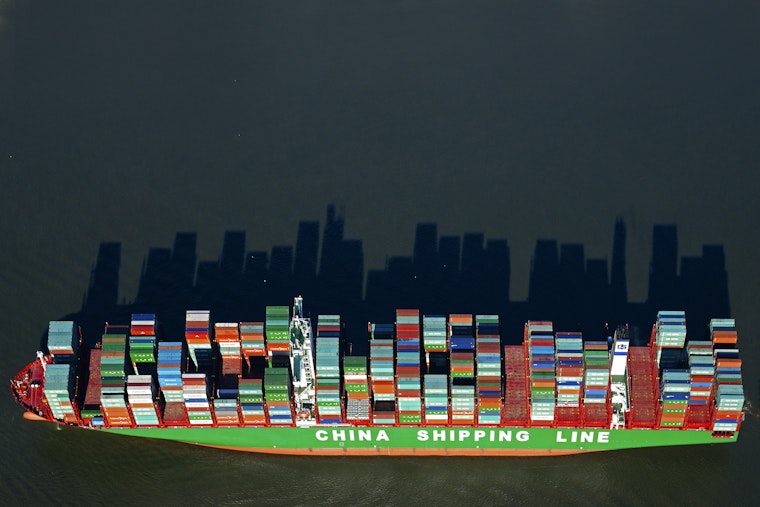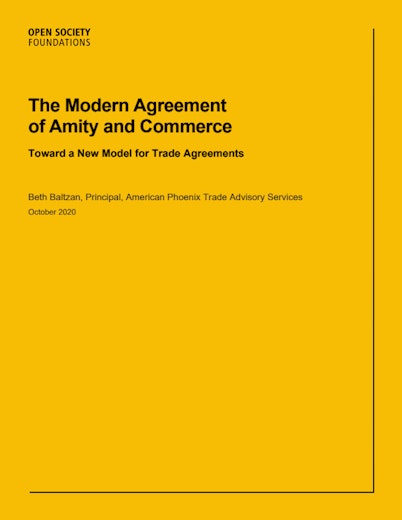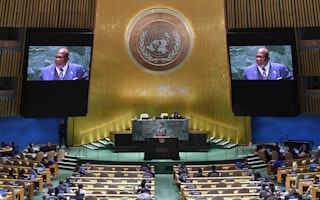It’s Time to Rethink How We Regulate Global Trade
By Beth Baltzan

Countries around the world are struggling to understand, and adjust to, the upheaval in the global trade order. The United States, historically a leader in shaping globalization, withdrew from the Trans-Pacific Partnership in 2016 and refuses to allow the World Trade Organization to adjudicate disputes to finality. Attributing these actions to U.S. President Donald Trump is technically accurate, but misses the much more profound and widespread concern over whether the rules of globalization are working.
The votes for the Trans-Pacific Partnership in the U.S. Congress were never there—not because of knee-jerk protectionism, but because members of Congress had real concerns about the rules in the agreement, be it on automotive supply chains, pharmaceutical monopolies, or special litigation procedures that allowed corporations to challenge sovereign government regulation. Indeed, frustration in the United States with the way the World Trade Organization dispute settlement system fabricated obligations the countries never agreed to goes all the way back to the George W. Bush administrations.
In this regard, Trump’s actions were not an idiosyncratic break with the past, but rather the manifestation of a much deeper paradigm shift. For decades, the world has operated under a laissez-faire global regime. Under this paradigm, the rules are designed to prevent governments from intervening in what is assumed to be a global market based on fair competition. Thus, most World Trade Organization and regional trade agreement rules are designed to get governments to defer to businesses—to the global marketplace—to make decisions because businesses are better at it. Or so we are told.
By leaving people all over the world short of life-saving medical equipment, the pandemic has highlighted the profound flaws of this mindset. Corporations did not offshore to China because of “comparative advantage,” but because of unfair competition. A government that actively intervenes in the economy is able to exploit the rules of a system designed to defer to businesses, and thereby lure supply chains to its shores. It does so through a range of tools, be it currency manipulation, industrial subsidies, environmental suppression, or labor rights violations. Businesses chasing returns on their investments responded accordingly.
Other governments, including that of the United States, trusted the laissez-faire rules of globalization to lead us to the right production decisions. It didn’t happen; we ended up with concentrated supply chains—and supply shortages. In the meantime, labor’s share of the global gross domestic product has declined relative to capital’s share. We should not be surprised that ordinary people around the world are questioning whether this system works for them.
But among elites, faith in the laissez-faire model of trade is so ingrained that they cannot conceive that there is any other way to do it. The very notion of government intervention to protect the marketplace itself is automatically labeled “protectionist,” a pejorative term ascribed to anyone who rejects trickle-down economics—or embraces fair competition—as the basis for the rules-based global trading regime.
But while our college economics professors taught us that laissez-faire globalization produces the most efficient outcome, at least in theory, they failed to teach us that there was, in fact, another way. As it turns out, the founders of the multilateral trading system not only did not believe a laissez-faire global model would serve humanity but one of them, John Maynard Keynes, said it would be “disastrous.”
Keynes and his U.S. New Deal counterparts did not believe governments should genuflect before business. On the contrary, having seen the destabilizing consequences of unchecked corporate power—be it the 1929 stock market crash or the disturbing relationship between oligarchs and fascists in the 1930s—they believed any global trading regime needed to protect competition itself. They crafted an agreement with rules to discipline currency manipulation and monopolistic behavior, as well as to protect against the exploitation of labor. The forced labor camps we now see in Xinjiang in China would have been barred by their rules, whereas, today, they are tolerated by those of the World Trade Organization.
The founders’ 1948 agreement, known as the Havana Charter, died in the U.S. Congress. History fails us again, leading us to believe Congress was simply in an isolationist mood. But that version of the story ignores the active role the U.S. business community, including the Chamber of Commerce, the National Association of Manufacturers, and the National Foreign Trade Council, played in opposing the Charter—precisely because of its Keynesian orientation.
Because of the failure of the charter, the global trading system defaulted to a regime of simple tariff cuts, with no disciplines on anticompetitive behavior by governments or businesses. To the extent we remember the Havana Charter at all, we remember it not for its substance, but for its failure.
Today, our trade agreements are more than 30 chapters long, the vast majority of which have nothing to do with tariffs and are instead meant to enhance corporate power—at the direct expense of sovereign power. The philosopher Adam Smith, lauded as the father of free-trade economics, warned us about the “mean rapacity, the monopolizing spirit of merchants and manufacturers, who neither are, nor ought to be, the rulers of mankind.” Yet by using trade agreements to transfer control over economic regulation from sovereign governments to corporations, that is exactly what we have done.
As we struggle to find a way forward on trade, we can take inspiration from the vision of the founders of the system. In 1948, they crafted rules that promoted inclusive prosperity and fair competition. They believed these rules were essential to preserving democracy, not only to prevent the resurgence of fascism but to address the looming threat of Soviet state trading. Indeed, their rules were designed to prevent the ability of an authoritarian government with control over its economy to use the global trading system to serve illiberal ends—which is just what we are facing today.
The pandemic has exposed the flaws of the laissez-faire paradigm. The remedy lies in the vision of the founders of the system 70 years ago.
The Open Markets Institute is a grantee of the Open Society Foundations.
Beth Baltzan is a fellow at the Open Markets Institute and a former Democratic Counsel to the House Ways and Means Subcommittee.


